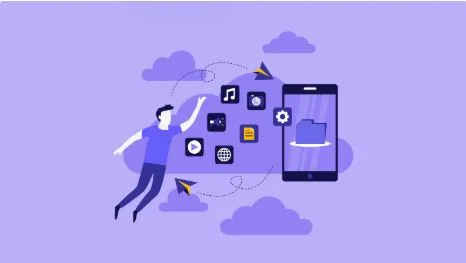Mobile App Business Ideas in the Entrepreneurial Landscape
Did you know the mobile app market is on track to hit $782 billion by 2029? That’s a 68% jump from $465 billion in 2022, a massive opportunity for entrepreneurs ready to innovate.
But what makes a mobile app business idea successful? The most successful apps solve real problems for specific users. Instead of diving into crowded markets, they create new ones.
If you’re looking to start a mobile app business in 2025, you’re in the right place. We’ve grouped the top app ideas into three categories to help you focus your efforts:
- Consumer-facing disruptive applications
- Enterprise and B2B mobile solutions
- Tech-powered niche service tools
Each category brings unique monetization opportunities and growth potential. Let’s explore mobile app business ideas along with proven models and launch strategies.
Understanding the Mobile App Opportunity
To build a successful app, you must understand the current landscape. That means watching user behaviour and staying on top of trends. With the right insights, developers can create apps that truly connect with users.
Why mobile first matters
People spend most of their digital time on mobile. In fact, 88% of mobile time is spent in apps, not browsers. Mobile commerce makes up 59% of all online sales. And the average American checks their phone every 5.5 minutes, that’s 262 times a day.
Avoid saturated niches
Many markets are already flooded with apps. The smarter move is to address specific, often overlooked problems, especially in industries that are still using outdated processes. These “irrelevant” pain points can turn into big business opportunities.
Do a competitor audit to find feature gaps. Discuss daily frustrations with potential users. Test your idea with a landing page or waitlist to gauge interest before investing time in development.
App Business Models
Several business models consistently deliver results:
- Mobile Commerce: Tailored for mobile behaviour, it drives conversions.
- Enterprise Tools: Improve efficiency and cut costs by up to 40%.
- Specialized Services: Meet niche industry needs and command premium pricing.
You can earn through:
- Subscriptions: Predictable revenue and 3–5x higher lifetime value.
- Freemium Models: 2–5% conversion to paying customers.
- In-App Ads: $2–$5 CPM with accurate targeting.
- Transaction Fees: Earn 15–30% per transaction for convenience.
Consumer-Facing Disruptive App Ideas
The right consumer app can transform daily activities. These ideas leverage emerging technologies to create compelling user experiences.
| App Idea | Category | What It Solves |
| AR Shopping App | Consumer-facing disruptive app | Lets users preview products in their space before buying |
| Eco-Friendly Route Planner | Consumer-facing disruptive app | Offers low-emission travel routes with air quality info |
| Parking Space Finder | Consumer-facing disruptive app | Helps drivers locate and book private parking in real-time |
| On-Demand Home Services | Enterprise & B2B mobile solution | Connects users with verified local service providers |
| HR/Employee Communication App | Enterprise & B2B mobile solution | Streamlines internal communication and boosts engagement |
| Expense Management Tool | Enterprise & B2B mobile solution | Simplifies budgeting and reporting for users and businesses |
| AI Health Check & Food Tracker | Tech-powered niche service tool | Tracks health stats, identifies food via images, gives nutrition tips |
| AI Skincare Assistant | Tech-powered niche service tool | Analyses skin and recommends personalised skincare routines |
| AR Workforce Training Tool | Tech-powered niche service tool | Delivers hands-on AR training for new employees |
Augmented Reality (AR) Shopping App
AR shopping mobile app ideas offer the option to try before you buy. These apps enable customers to see how things will look in their environment before they buy them, which makes them feel more sure about their choices. As a result, stores have more engaged customers and fewer returns.
These apps use technologies for 3D modelling and spatial mapping. Users simply aim their camera at a spot, and virtual products appear instantly. There are various ways to earn money, including transaction-based commissions and monthly subscriptions for premium features.
Eco-Friendly Route Planner
People are more aware of the environment than ever before. That problem is solved with an eco-friendly route planner. The program determines the amount of carbon each type of transportation emits.
One of the advanced features is the ability to check air quality along routes in real-time. People can choose public transportation solutions that have a smaller carbon impact.
Parking Space Finder / Marketplace
Finding parking is a daily frustration in crowded cities. A parking marketplace app helps ease that stress by allowing property owners to rent out underused private spaces. Real-time availability updates ensure drivers don’t waste time heading to already occupied spots. With this app, users can secure guaranteed parking in high-demand areas, while property owners earn extra income. The platform generates revenue through commissions on each rental and optional premium listings for increased visibility.
Enterprise & B2B Mobile Solutions
Business-focused apps help companies solve operational challenges. These solutions improve efficiency and reduce costs across organizations.
On-Demand Home Services Platform
The growth of the gig economy is transforming the global service industry. On-demand home services platforms show this change. These platforms connect users with professionals, such as plumbers, electricians, and cleaners, with just a few taps.
These platforms have some key features. They build trust by verifying provider profiles and doing background checks. They utilize AI-powered algorithms to match customers with the most suitable service providers. They also allow customers to track technicians in real-time. This tracking is often accurate to within 5 minutes.
This groundbreaking model has a big impact on the industry. Customers appreciate the convenience of receiving prompt assistance. People offering services receive a steady stream of jobs without spending money on marketing.
HR/Employee Communication App
Many companies continue to struggle with effective communication. An HR communication app streamlines this critical business function. Employees can easily access their pay stubs, understand their benefits, and stay informed about company news.
The platform supports paperless onboarding through secure document signing. It also includes built-in feedback tools that encourage more responses than traditional methods. Compliance notifications help organisations stay on top of regulations, while emergency communication features ensure teams can act quickly when needed.
Expense/Finance Management Tools
Managing money is hard for both people and corporations. Tools for managing expenses make it easy to track and report on your finances. People can snap images of receipts, sort their costs, and make reports.
With cutting-edge OCR technology, receipts can be automatically scanned to extract information with great accuracy. Smart AI-driven sorting reduces the need for manual entry, thereby accelerating the process of tracking expenses. An experienced AI app development company can integrate real-time budget alerts that notify customers when they are approaching their spending limits, helping them stay on top of their finances.
Tech-Driven Special Tools
New technology creates entirely new groups of specialised apps. These tools fix problems that we couldn’t tackle before.
Phone Health Checks & Food-Tracking AI
Healthcare becomes more accessible with AI-powered check-up apps. These apps link up with wearables to track key health statistics. Users are warned about possible health problems by early warning systems.
AI-powered symptom checkers provide accurate information that often aligns with what doctors believe. Remote health monitoring systems have been found to significantly reduce the likelihood of hospital readmissions by sending early alerts and continuously tracking patients.
Food-tracking apps use artificial intelligence to analyse dietary habits. With the help of computer vision, these apps can recognise foods from images with remarkable precision.
Skincare App with AI Guidance
Most people don’t have the expert knowledge needed to create personalized skincare routines. Skincare apps powered by AI step in to fill the knowledge gap.
Algorithms that analyze skin spot acne, wrinkles, and problems with pigmentation. Customized routines change to meet skin needs as they evolve. Insights into ingredients help users understand how well products work scientifically.
AR Tools to Enhance Workforce Training
Employee training often leads to lost productivity and high costs for businesses. AR training tools help reduce these challenges by offering immersive, hands-on learning experiences. Through AR overlays on equipment, employees receive clear, visual guidance during training.
Instructions are written right on the machine parts, and interactive walkthroughs break up complicated procedures into easy-to-follow steps. This method accelerates and enhances training, enabling new employees to learn more quickly and retain information more effectively.
Execution Challenges & Best Practices
Creating a successful app involves more than just a great idea. Entrepreneurs can avoid costly mistakes by knowing common problems.
Why Apps Fail:
- No Match Between Problem and Market: A big chunk of new companies go under because they make things nobody wants. This often happens when they skip checking with users, wasting time and money on development.
- Bad User Experience (UX): Even when the ideas are solid, a clunky user experience makes people quit using the app.
Key UX and UI Parts:
- Make it Easy to use: Top apps are simple to navigate. Try to design tasks that users can finish in three clicks or fewer.
- Keep it Simple: A clean and uncluttered interface helps users focus and stay engaged. This reflects modern ui/ux trends that prioritize clarity and usability.
- Nail the First Experience: Showing new users how to use the app in context can boost retention.
- Look the Same Everywhere: Ensure your app functions and appears consistently across all devices.
Conclusion
The mobile world offers big chances to entrepreneurs. We’ve identified high-impact business ideas for mobile app across consumer, business, and technology sectors. The apps that do best are those that solve real problems people face every day.
Start by finding everyday pain points. Create basic working products and test them with real users. Utilise mobile-first strategies that leverage the capabilities of smartphones. Instead of following tech trends, work on fixing real problems.
Mobile innovation is popular in the startup world in 2025. If you plan and execute your app idea effectively, it could be the next great thing. The most important question isn’t whether mobile apps make money, but what problems you want to solve with this platform.




